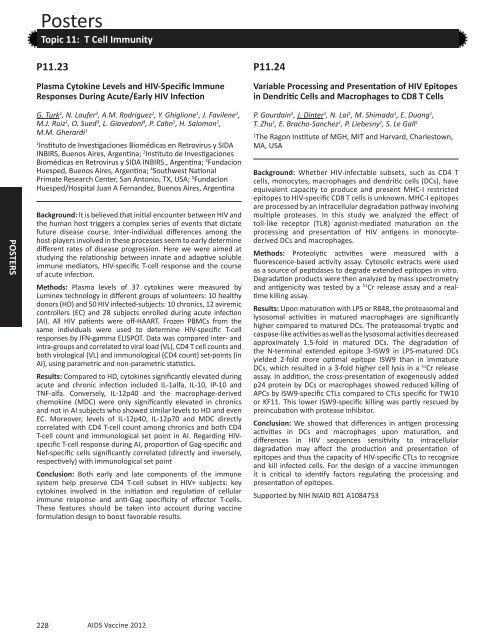Oral Abstract Session 01 - Global HIV Vaccine Enterprise
Oral Abstract Session 01 - Global HIV Vaccine Enterprise
Oral Abstract Session 01 - Global HIV Vaccine Enterprise
Create successful ePaper yourself
Turn your PDF publications into a flip-book with our unique Google optimized e-Paper software.
POSTERS<br />
Posters<br />
Topic 11: T Cell Immunity<br />
P11.23<br />
Plasma Cytokine Levels and <strong>HIV</strong>-Specific Immune<br />
Responses During Acute/Early <strong>HIV</strong> Infection<br />
G. Turk 1 , N. Laufer 2 , A.M. Rodriguez 1 , Y. Ghiglione 1 , J. Favilene 1 ,<br />
M.J. Ruiz 1 , O. Sued 3 , L. Giavedoni 4 , P. Cahn 5 , H. Salomon 1 ,<br />
M.M. Gherardi 1<br />
1 Instituto de Investigaciones Biomédicas en Retrovirus y SIDA<br />
INBIRS, Buenos Aires, Argentina; 2 Instituto de Investigaciones<br />
Biomédicas en Retrovirus y SIDA INBIRS., Argentina; 3 Fundacion<br />
Huesped, Buenos Aires, Argentina; 4 Southwest National<br />
Primate Research Center, San Antonio, TX, USA; 5 Fundacion<br />
Huesped/Hospital Juan A Fernandez, Buenos Aires, Argentina<br />
Background: It is believed that initial encounter between <strong>HIV</strong> and<br />
the human host triggers a complex series of events that dictate<br />
future disease course. Inter-individual differences among the<br />
host-players involved in these processes seem to early determine<br />
different rates of disease progression. Here we were aimed at<br />
studying the relationship between innate and adaptive soluble<br />
immune mediators, <strong>HIV</strong>-specific T-cell response and the course<br />
of acute infection.<br />
Methods: Plasma levels of 37 cytokines were measured by<br />
Luminex technology in different groups of volunteers: 10 healthy<br />
donors (HD) and 50 <strong>HIV</strong> infected-subjects: 10 chronics, 12 aviremic<br />
controllers (EC) and 28 subjects enrolled during acute infection<br />
(AI). All <strong>HIV</strong> patients were off-HAART. Frozen PBMCs from the<br />
same individuals were used to determine <strong>HIV</strong>-specific T-cell<br />
responses by IFN-gamma ELISPOT. Data was compared inter- and<br />
intra-groups and correlated to viral load (VL), CD4 T cell counts and<br />
both virological (VL) and immunological (CD4 count) set-points (in<br />
AI), using parametric and non-parametric statistics.<br />
Results: Compared to HD, cytokines significantly elevated during<br />
acute and chronic infection included IL-1alfa, IL-10, IP-10 and<br />
TNF-alfa. Conversely, IL-12p40 and the macrophage-derived<br />
chemokine (MDC) were only significantly elevated in chronics<br />
and not in AI subjects who showed similar levels to HD and even<br />
EC. Moreover, levels of IL-12p40, IL-12p70 and MDC directly<br />
correlated with CD4 T-cell count among chronics and both CD4<br />
T-cell count and immunological set point in AI. Regarding <strong>HIV</strong>specific<br />
T-cell response during AI, proportion of Gag-specific and<br />
Nef-specific cells significantly correlated (directly and inversely,<br />
respectively) with immunological set point<br />
Conclusion: Both early and late components of the immune<br />
system help preserve CD4 T-cell subset in <strong>HIV</strong>+ subjects: key<br />
cytokines involved in the initiation and regulation of cellular<br />
immune response and anti-Gag specificity of effector T-cells.<br />
These features should be taken into account during vaccine<br />
formulation design to boost favorable results.<br />
228<br />
AIDS <strong>Vaccine</strong> 2<strong>01</strong>2<br />
P11.24<br />
Variable Processing and Presentation of <strong>HIV</strong> Epitopes<br />
in Dendritic Cells and Macrophages to CD8 T Cells<br />
P. Gourdain 1 , J. Dinter 1 , N. Lai 1 , M. Shimada 1 , E. Duong 1 ,<br />
T. Zhu 1 , E. Bracho-Sanchez 1 , P. Liebesny 1 , S. Le Gall 1<br />
1The Ragon Institute of MGH, MIT and Harvard, Charlestown,<br />
MA, USA<br />
Background: Whether <strong>HIV</strong>-infectable subsets, such as CD4 T<br />
cells, monocytes, macrophages and dendritic cells (DCs), have<br />
equivalent capacity to produce and present MHC-I restricted<br />
epitopes to <strong>HIV</strong>-specific CD8 T cells is unknown. MHC-I epitopes<br />
are processed by an intracellular degradation pathway involving<br />
multiple proteases. In this study we analyzed the effect of<br />
toll-like receptor (TLR) agonist-mediated maturation on the<br />
processing and presentation of <strong>HIV</strong> antigens in monocytederived<br />
DCs and macrophages.<br />
Methods: Proteolytic activities were measured with a<br />
fluorescence-based activity assay. Cytosolic extracts were used<br />
as a source of peptidases to degrade extended epitopes in vitro.<br />
Degradation products were then analyzed by mass spectrometry<br />
and antigenicity was tested by a 51Cr release assay and a realtime<br />
killing assay.<br />
Results: Upon maturation with LPS or R848, the proteasomal and<br />
lysosomal activities in matured macrophages are significantly<br />
higher compared to matured DCs. The proteasomal tryptic and<br />
caspase-like activities as well as the lysosomal activities decreased<br />
approximately 1.5-fold in matured DCs. The degradation of<br />
the N-terminal extended epitope 3-ISW9 in LPS-matured DCs<br />
yielded 2-fold more optimal epitope ISW9 than in immature<br />
DCs, which resulted in a 3-fold higher cell lysis in a 51Cr release<br />
assay. In addition, the cross-presentation of exogenously added<br />
p24 protein by DCs or macrophages showed reduced killing of<br />
APCs by ISW9-specific CTLs compared to CTLs specific for TW10<br />
or KF11. This lower ISW9-specific killing was partly rescued by<br />
preincubation with protease inhibitor.<br />
Conclusion: We showed that differences in antigen processing<br />
activities in DCs and macrophages upon maturation, and<br />
differences in <strong>HIV</strong> sequences sensitivity to intracellular<br />
degradation may affect the production and presentation of<br />
epitopes and thus the capacity of <strong>HIV</strong>-specific CTLs to recognize<br />
and kill infected cells. For the design of a vaccine immunogen<br />
it is critical to identify factors regulating the processing and<br />
presentation of epitopes.<br />
Supported by NIH NIAID R<strong>01</strong> A1084753


